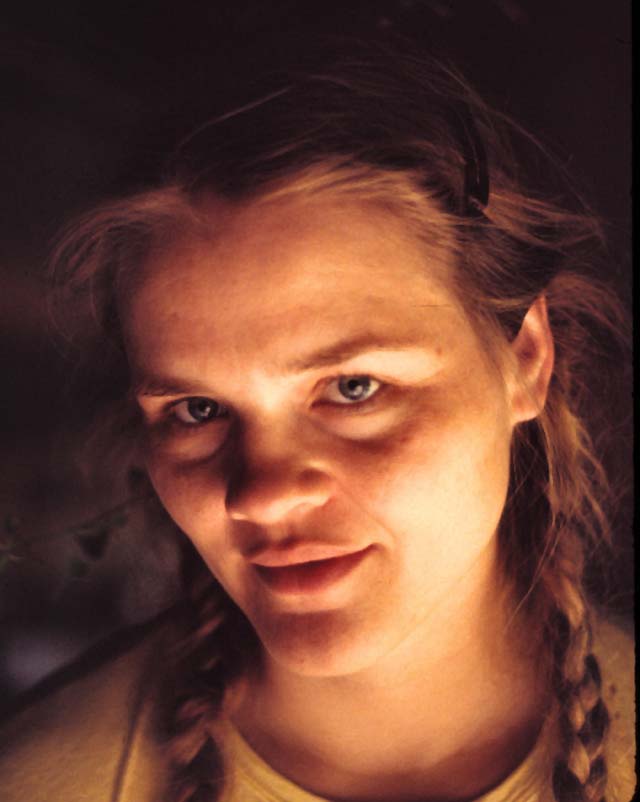The second place we lived in Southern California is called the Oxnard plain. It has ten feet of topsoil, I'm sure. No, really, I think I read that somewhere. Apparently it was an alluvial flood plain, and so over the centuries or millennia, lots of soil was washed down here and deposited. As I drove around the area doing my mom errands, I could see them plowing and planting and I was just astounded that anywhere could have such soil in combination with their year-round fabulous weather. Here's a photo:
 Those aren't rocks, or even pebbles in the photo, just chunks of dirt. It is soil, through and through--full of nutrients, and deeper than you could ever plant. It would grieve me to see them covering it up and building houses and shopping centers in what was once a strawberry field.
Those aren't rocks, or even pebbles in the photo, just chunks of dirt. It is soil, through and through--full of nutrients, and deeper than you could ever plant. It would grieve me to see them covering it up and building houses and shopping centers in what was once a strawberry field.
 Those aren't rocks, or even pebbles in the photo, just chunks of dirt. It is soil, through and through--full of nutrients, and deeper than you could ever plant. It would grieve me to see them covering it up and building houses and shopping centers in what was once a strawberry field.
Those aren't rocks, or even pebbles in the photo, just chunks of dirt. It is soil, through and through--full of nutrients, and deeper than you could ever plant. It would grieve me to see them covering it up and building houses and shopping centers in what was once a strawberry field.The reason it was so traumatic for me to see them use the ground there for something other than growing plants is that my childhood experience with dirt was so much different, and so difficult. Apparently, the farm my parents moved onto when I was two weeks old, was anciently the pathway of a long-gone glacier. Every spring the snow melted to expose the new generation of smooth rocks were heaved up from beneath the ground by the forces of frost. My dad would plow, and sometimes we'd run a harrow over that acreage, too, making it easier to walk across behind the wagon as we picked up the hundreds and hundreds of rocks. Plowed ground was rough with the deep furrows and was difficult to drive the wagon on, and even more difficult to keep your balance as you trudged along looking for the stupid rocks. But they had to be removed, because you could not possibly use the drill (seed planter) without removing the rocks. It would have broken the discs right off from it. Plus, if the rocks were sitting up on top of the ground, then whatever machine you used to cut the crop would also have been damaged by the rocks. So, every spring--picking rocks.
And it wasn't like you'd eventualy get them thinned out and one year there'd be no more. There was obviously a limitless supply! Once, we used the crowbar to pry up a really big one, and under it was a "nest" of smaller rocks, and my dad (he was a humorist) exclaimed, "Oh, look! We got ourselves a brood sow--this'll cut back on next year's supply." Not really. We'd pile them up along the fence lines, and eventually, he just designated one place in the middle of the farm for the rock pile, and we'd dump them there. I wondered how it would be when centuries later, archeologists would be excavating my parent's farm and come upon this huge pile of rocks and how they'd interpret the significance of it in our culture.
Finally, Daddy planted alfalfa instead of barley in the biggest field we'd picked for years. This didn't make the rocks go away, but at least he didn't have to plow it every spring. Alfalfa is a perennial crop, and just grows back year after year without having to be planted. When the last day of school came, and other kids were off to a swimming party, we'd be off to the field to finish the rocks. I remember going up and picking rock before school one chilly morning. I don't know who milked! Of all the crummy jobs we did on the farm, this ranked right up there in the top five of Crummiest. Here's a picture of me, two weeks before the birth of my first child, on a visit to my parents and helping the rock picking crew. (What WAS I thinking??)
 Ultimately, however, my dad was able to market his Best Crop: when the state decided to move the highway, they bought the whole giant pile of rocks from my brother who'd taken over the farm after Daddy's death. They used them to help build the roadbed. I like to think of my dad exulting up there in heaven as all our labor finally paid off. I always think of him whenever I travel past farmland and see the dirt. I hope someday, in the eternities, he'll get to farm on a place like the Oxnard plain: just plow it and plant it---that is farmer heaven.
Ultimately, however, my dad was able to market his Best Crop: when the state decided to move the highway, they bought the whole giant pile of rocks from my brother who'd taken over the farm after Daddy's death. They used them to help build the roadbed. I like to think of my dad exulting up there in heaven as all our labor finally paid off. I always think of him whenever I travel past farmland and see the dirt. I hope someday, in the eternities, he'll get to farm on a place like the Oxnard plain: just plow it and plant it---that is farmer heaven.

No comments:
Post a Comment